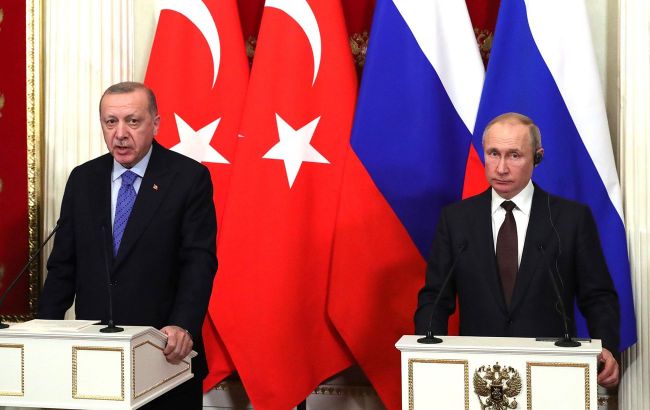US sanctions hit Turkish-Russian trade, says Reuters
 Photo: Recep Erdogan and Vladimir Putin (Getty Images)
Photo: Recep Erdogan and Vladimir Putin (Getty Images)
The US threat to impose sanctions on financial companies doing business with Russia has chilled Turkish-Russian trade, disrupting or slowing some payments for both imported oil and Turkish exports, writes Reuters.
The December US package did not directly address energy, but it did complicate some Turkish payments for Russian oil, as well as Russian payments for a wide range of Turkish exports, the agency's sources said.
The US sanctions are aimed at cutting the Kremlin's revenues and disrupting its war against Ukraine without choking off the flow of Russian oil to global markets to avoid a politically sensitive spike in US gasoline prices ahead of November's presidential election.
However, payment problems similar to those currently facing Türkiye have already disrupted Russian oil supplies to India and hampered supplies to the UAE and China, oil traders said.
Russia is the biggest exporter of crude oil and diesel fuel to energy-poor NATO member Türkiye, delivering 8.9 million tonnes of crude oil and 9.4 million tonnes of diesel fuel in the 11 months to November.
According to four sources, the problems with payments that arise are related to the fact that Turkish banks are reviewing the business and increasing the requirements for Russian customers. They did not disrupt crude supplies to Türkiye, holding up only a small number of shipments, two oil industry sources said.
A source in a Russian oil company said that Russian oil exporters had not received payments from Türkiye for two to three weeks.
"It has become difficult to make some energy payments to Russia, especially after the new sanctions (threat) at the end of December. Some payments were disrupted," said a Turkish source familiar with the payment issue.
A source in the Turkish oil industry said the payment problems started after December.
Ankara opposes Western sanctions against Moscow despite criticizing Russia's invasion of Ukraine two years ago. Throughout the conflict, it managed to maintain close ties with both Moscow and Kyiv.
While Ankara has said sanctions cannot be circumvented on Turkish soil, last year Washington stepped up pressure to stop the transit of dual-use goods that Russia could use on the battlefield and warned that Turkish banks and companies could be hit by secondary sanctions.
Thorough inspection
The disruption of Russian-Turkish payments began when Biden signed an executive order on December 22 threatening firms that help Russia circumvent sanctions with the risk of losing access to the US financial system.
Financial institutions that conduct business on behalf of individuals subject to US sanctions are at risk, the decree said.
Elvira Nabiullina, head of the Central Bank of the Russian Federation, said on Friday that additional difficulties have arisen in foreign trade operations related to calculations and logistics.
According to a Turkish banker, banks have "extremely meticulous" sanctions procedures and compliance departments scrutinize all transactions.
A senior US State Department official told Reuters he was encouraged by reports that Turkish banks are reviewing existing business and strengthening their compliance programs for Russian clients.
"The President's Dec. 22 amendment to our Russia sanctions authority re-affirmed what we've said previously: that foreign financial institutions are responsible for ensuring they do not process transactions that benefit Russia's military or otherwise enable circumvention of our measures," he said.
Initial data showed that Turkish exports to Russia fell 39% year-on-year to $631 million in January. Imports from Russia fell by 20.2% to $4 billion in January.
Most of the impact was on non-oil trade, sources said. "Exports of machinery, in particular, stopped simply because of the similarity with military equipment," the first source familiar with the matter said.
"The real problem arises not with the payment that Türkiye should make, but with the payment that Türkiye will receive. This shows the high level of hesitation Turkish banks have towards sanctions," the source said.
US December package
On December 22, US President Joe Biden signed a decree on strengthening sanctions against financial institutions that help Russia. These banks can be deprived of access to the US financial system, which means the actual destruction of the financial institution.

